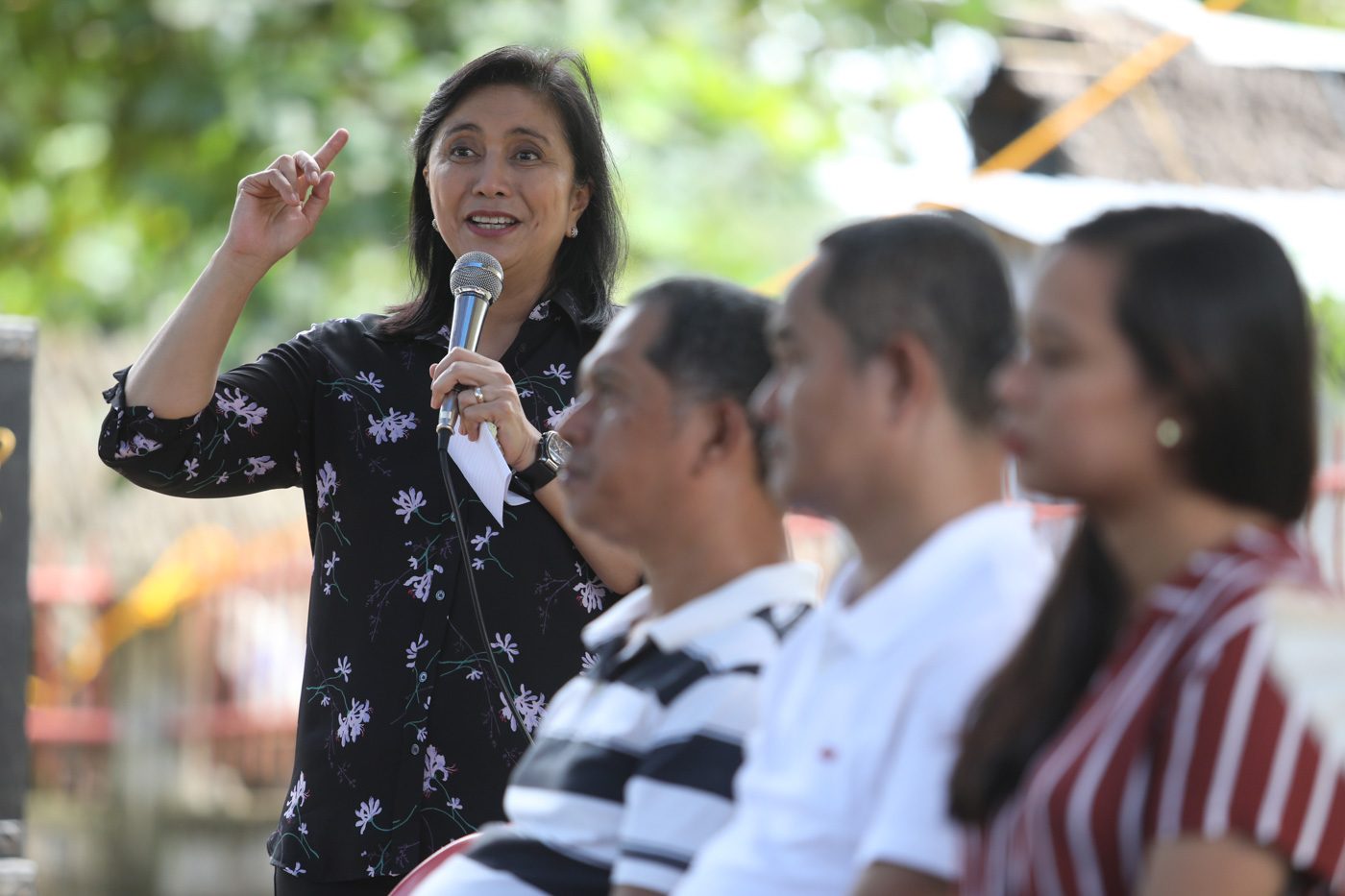SUMMARY
This is AI generated summarization, which may have errors. For context, always refer to the full article.

MANILA, Philippines – Vice President Leni Robredo criticized President Rodrigo Duterte for having “hastily” scrapped a key military pact with the US, when he had been slow to act on other pressing matters concerning the country, such as the novel coronavirus outbreak.
“Nakakagulat na ganoong kabilis, kasi iyong naiisip ko, iyong pumutok iyong coronavirus – iyon, iyong agarang pagdesisyon ng pamahalaan, kinakailangan para maproteksyunan iyong kalusugan ng mga mamamayan, pero naghintay pa ng ilang araw bago magdesisyon. Pero ito, parang sinantabi iyong pakikiusap ng AFP, ng Senate, ng iba pang mga opisyal ng pamahalaan,” Robredo told reporters in Pili, Camarines Sur, on Wednesday, February 12.
(It’s surprising how quick that was, because I was thinking, when the coronavirus broke out – that needed quick decision-making by the government to protect the health of the people, but it waited several days for a decision. But this one, it seemed to have sidelined appeals by the Armed Forces of the Philippines, the Senate, by other government officials.)
Duterte renewed threats to terminate the country’s Visiting Forces Agreement (VFA) with the US on January 23, a day after his political ally Senator Ronald “Bato” dela Rosa said that his US visa had been canceled. Duterte gave the US a month’s ultimatum to restore Dela Rosa’s visa.
The visa cancllation appears to have been a sanction stemming from the US Senate’s application of the Global Magnitsky Act to operators of Duterte’s violent “war on drugs,” which Dela Rosa implemented as Duterte’s first national police chief.
Despite efforts from Cabinet members and lawmakers to hold off the VFA’s termination, at least until after a thorough study of its consequences, Duterte ordered that the US government be officially notified of his decision on Tuesday, February 11.
Downplayed threat
News of the outbreak of a new virus in China came out in December 2019, and by January 5, health officials were pushing for closer monitoring of visitors from China coming in through airports and harbors.
Duterte issued a travel ban on visitors from China’s Hubei province – the epicenter of the novel coronavirus outbreak – on January 31, a day after health officials confirmed the first case of the infection in the Philippines.
By the time Duterte addressed the public about the virus in a media conference on February 3, a second case of the viral infection in the Philippines had been confirmed – and had died, becoming the first death from the disease outside China.
Duterte then downplayed the threat from the virus – now called “Covid-19” – saying it would die on its own. The country has had a total of 3 confirmed cases of the infection.
Robredo had earlier called on Duterte to act fast and ban travelers from mainland China in order to prevent further infections.
‘National security at stake’
Last week, the Vice President said she would support a review of the VFA and other defense pacts for whether they satisfy “prevailing conditions.”
On Wednesday, she questioned Duterte’s motive for scrapping the VFA, especially since members of his own Cabinet warned that it would largely be against the Philippines’ own interests.
“Hindi ko maintindihan kung ano iyong dahilan. Isang bagay na kailangang pag-aralan nang mabuti, isang bagay na kailangang pagdiskusyunan muna, bakit minamadali? Minamadali ba dahil sa galit na hindi napagbigyan iyong mga kaalyado? Galit dahil sa may kinanselang visa? Parang hindi ito tama, na iyong security ng ating bansa iyong nakataya,” she said.
(I don’t understand what the reason is. Something that requires careful study, something that first needs to be discussed, why would you rush it? Is it rushed because of anger over allies not having gotten their way? Anger over a canceled visa? It does not seem right, that the security of our country is what’s at stake.)
Repealing the VFA would entail a major drawdown of US military troops in the Philippines, whose presence is seen to be a deterrent against an expansionist China in the West Philippine Sea, and whose assistance in intelligence and surveillance have contributed to the Philippine military’s strategic gains in counterterrorism.
“All we are asking is a proper study. What’s wrong with sitting down and listening to perspectives from other sectors?” Robredo asked in Filipino.
“Dito ako nagugulat kasi may mga inaasahan tayong agarang desisyon, hindi naman nagdedesisyon kaagad. Pero ito na kailangang pag-isipan nang maayos, sobra naman yatang bilis,” the Vice President added.
(This is what surprises me because there are decisions we expect to be made quickly, but are not decided on right away. But this one that needs to be thought through properly seems to have been too hasty.) – Rappler.com
Add a comment
How does this make you feel?
There are no comments yet. Add your comment to start the conversation.